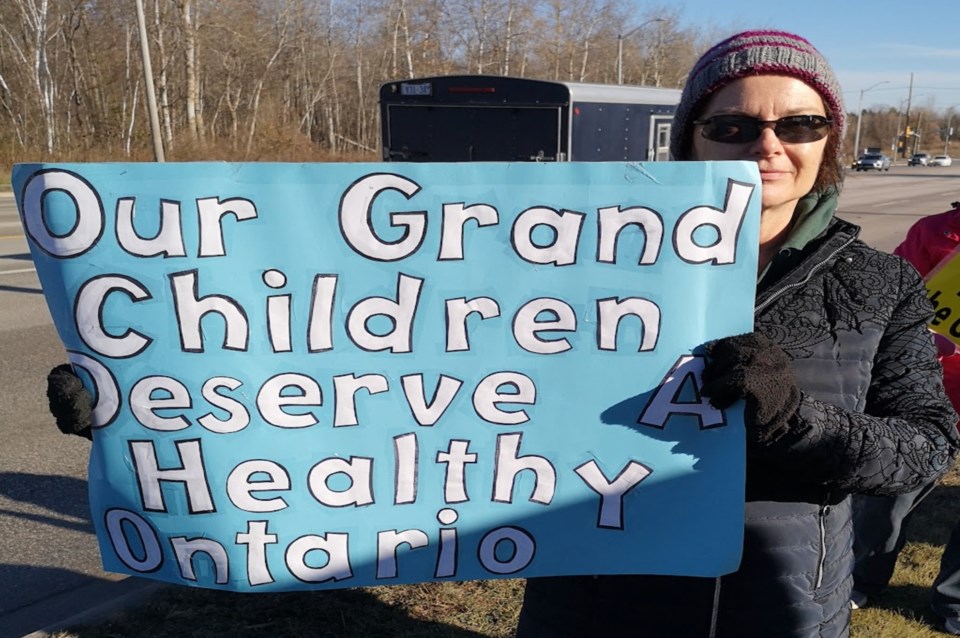This is the second in a three-part series of guest columns from the Simcoe County Greenbelt Coalition leading up to An Evening with Margaret Atwood, a sold-out fundraising event slated for Oct. 28.
In my last column, I spoke about how our area, its economy, people and communities are deeply connected to the Greenbelt.
I also outlined how this connection has translated into political pressure, with our region seeing some of the most active voices and outpouring of support in response to the corrupted Greenbelt land takeouts. The breadth and depth of this public support stands in stark contrast to the local MPPs who were among those voting to take land out of the Greenbelt.
Recent polling confirms the deep connection our region has to the environment. In 2016, Environics found 94 per cent of us in Simcoe County wanted farmland and natural areas protected, and 82 per cent wanted urban development in places where infrastructure already existed — in other words, within existing settlement areas and not as sprawl.
This polling found the strength of support here was even stronger than that found in other areas, including York Region, Peel, Waterloo, Toronto and Durham.
People also understand projects like the Bradford Bypass don’t align with responsible development. Another poll, this time by Oracle, found a measly 29 per cent supported the project. This has since dropped to 20 per cent three years later. A large majority of us, 61 per cent, opposes the project.
I outline all of this information because policy changes under this government, with the support of local MPPs, run counter to these values and the clear priorities residents have for development that is responsible, that doesn’t end up costing us more in taxes, more in underfunded health care and education, more in lost farmland, air and water quality.
Citizens and local organizations are instrumental in understanding these policies and their effects on their communities and local environment, and they are ringing the alarms on the impacts these changes will have.
Case in point: provincially significant wetlands.
Simcoe County has a wealth of significant wetlands. Many overlap or are on the fringes of groundwater resources we depend on, like the Oro Moraine.
Bill 23 (which is now law) reduces protection for these areas. By narrowing the definition of what is considered a provincially significant wetland, many of them may lose their status, and thus no longer receive the same protection.
These changes also allow developers an outsized role in this process, giving them the power to reclassify wetlands to a downgraded status.
Master naturalist Bob Bowles, who evaluated most of those significant wetlands, says it will leave them extremely vulnerable to exploitation and degradation.
But it isn’t just wetlands, groundwater and wildlife we should be concerned with here. In addition to the habitat and other ecosystem services wetlands provide, they offer some of the best protection against flooding.
A recent report from this government outlines just how hard hit Ontario is likely to be by climate change. Flooding, it notes, increases conditions in which water-borne disease can develop, including by providing conditions for the proliferation of flies, ticks and mosquitoes that carry Lyme disease and West Nile virus.
The report continues, outlining how irresponsible development in floodplains and wetlands leads to an increased risk of flooding in the future.
Yet we continue to see policies that run counter to this science and put these floodplains and wetlands in more danger of being razed and paved.
Other changes under Bill 23 severely curtail the ability of municipalities to generate revenue from development. This is revenue municipalities use to deliver necessary infrastructure and services to those same developments, and was part of a long-standing understanding roughly captured by the phrase, “development pays for development.”
The County of Simcoe calculates these changes mean a loss of almost $200 million, with citizens now on the hook for a potential four to five per cent tax hike down the road. (Note how the costs for development have been shifted from developers to the public.)
Municipal leaders face difficult choices as a result, either to hike tax rates, reduce services, or some combination thereof. Regardless of their choice, the public loses.
Writ large, the environmental and housing policies of this government put much at risk, including places that clean our water, filter our air and prevent flooding. We want more development to happen in places where it makes the most sense. These are places where infrastructure currently exists and where it can be improved and expanded upon. This is what the residents of Simcoe County have stated in past polls.
People here know that we can build vibrant communities, that we can have thriving and sustainable economies, and that all of this is built on the foundation of a healthy environment.
If it weren’t for the leadership of local community groups and Indigenous communities, there would be little scrutiny of these policy changes. With an even more hollowed-out local media, it puts more responsibility on groups like the Simcoe County Greenbelt Coalition and its members to stay vigilant and uphold the values to which citizens so clearly adhere.
Margaret Atwood, acknowledging the leadership displayed by Indigenous communities and local groups in the Greenbelt takeout reversal, wants to ensure these local voices can remain strong into the future and is hosting a fundraiser at the end of October. She will be doubling the impact of public charitable donations made here, matching up to $10,000 in total. Together, we can protect what matters and have communities that reflect our values.
Margaret Prophet is the executive director of the Simcoe County Greenbelt Coalition.

